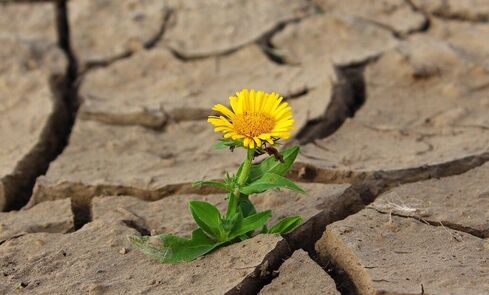By Joel Bates We are taking some time over the next several months to share some of the stories, situations, and meaning behind each of our Core Values and how these values have come to shape the ministry of Discovery Ministries. Committed to the Process of Wilderness is our fourth Core Value. We continue to find these to be relevant to our current way of life in the midst of the coronavirus pandemic. Wilderness exists in many forms. We call the high up, way back regions of Alaska and Canada “wilderness;” if the altitude and extreme cold don’t getcha, then the grizzly bears will. Beware of the Australian Outback wilderness—that waterless wasteland where fire ants, dingoes, and dehydration pose daily threats. And let’s not forget the 70% of planet Earth’s surface—the high seas—a wilderness where squalls materialize out of thin air, waves the height of buildings crush sailing vessels, and predators beneath the surface indiscriminately feed on plankton or people. These regions immediately portray “wilderness” for us. But, I think wilderness can also appear as apartheid alienation, pain and abandonment in the loss of a loved one, or uncharted chaos during a worldwide pandemic that separates people and threatens our well-being. I think we can all agree that wilderness is scary and often lies closer to home than we think. By definition, “wilderness” is as an uncultivated, uninhabited, and inhospitable region, but I think it is more than that. In fact, I believe everyone experiences a wilderness trial at some point in his life, and many of us are wandering in a wilderness right now. I take people orienteering. Now, some of you love getting lost between the pages of a good book. For others it’s losing yourself in a sporting event or in a deep conversation with an old friend. But, when I take people orienteering, we lose ourselves in the forest. No really, we get lost! I mostly know where I am because I’m the facilitator. The group, on the other hand, has no idea where they are. They have to use their tools—a map and compass—to get themselves unlost and out of the wilderness. I had given one team of students a destination atop a hill directly in front of them. They looked at the map skeptically, turning it round, squinting their eyes first at the map and then at the hill before them and then back at the map as they tried to gain some piece of perspective. Once satisfied with a plan, they set off to go around the hill. On the backside of that same hill, they glared at the map, annoyed that the hill remained imposing from their new vantage point. They set off again to skirt the base of the hill until they could get a better view of yet another steeply sloping side. They repeated this process for hours until, after exhausting all other options, they simply marched up the hill to the top. When I asked them why it had been such a difficult decision to go to the top, they responded that they thought there had to be an easier way. The truth? There was no easier way! Real life can intimidate us this way sometimes. When we are faced with an unfamiliar path, something out of our control, or a situation we don’t understand, we’d rather just avoid it. We become masters at avoiding the uncomfortable or unwanted inconveniences as we distract ourselves, trying to find another way around. Usually with God, there is no other way. Jesus said, “I am the Way, the Truth and the Life.” That’s a pretty black-and-white statement that leaves little room for argument. Ah, but consider how good this destination is. All of God’s destinations are good! Using the wilderness as a tool to grow His people is hardly new for God. For instance, we all remember His leading the faithless, rebellious Israelite's into the Sinai wilderness. They ended up wandering around for 40 years, and most stayed there in shallow, desert graves. But the new generation, who had grown up in the wilderness, facing its adversity on a daily basis and seeing God’s deliverance as commonplace, confidently stepped into the flood water and crossed the Jordan, marched around Jericho and captured the walled city, and overtook their enemies to conquer the Promised Land. When God’s people emerged from the wilderness, they were a very different people from the previous generation that entered the desert. And let’s not forget king David. He is known as the greatest king of Israel, but prior to his coronation, he spent years running and hiding from Saul. We can read many of the psalms that record his struggles during his time spent in isolation and exile, his wondering if God was ever going to see him through to his promised anointing. No other king of Israel experienced this tremendous trial of wilderness wandering, but no other king of Israel was as great as David. There’s a correlation: great biblical heroes often went through wilderness adversity in preparation for their calling. God knows that whether you’re facing giants in the land, economic uncertainty, or crisis in a difficult relationship, you just have to trust Him with your life—hand the fears and identities over to him, lay everything at his feet—and go through. Most wilderness produces dread and fear in us, but on the other side of the wilderness, we find a door by which we enter a vibrant, dynamic life. Here are some truths to consider as you deal with the process of wilderness:
1 Comment
Brett
5/27/2020 11:44:18 am
Good morning! Thank you for this article. How encouraging this is to read. The Lord is presently teaching me my tendencies to hide from the wilderness of life rather than see it as an invitation to grow in my trust in Him. These words have ministered to be greatly. Thank you for taking the time to share. Please keep writing.
Reply
Leave a Reply. |
Come along side us as we journey in and out of the wilderness, discovering our Creator in creation.
Archives
July 2024
Categories |
Contact Us
|
|

 RSS Feed
RSS Feed

